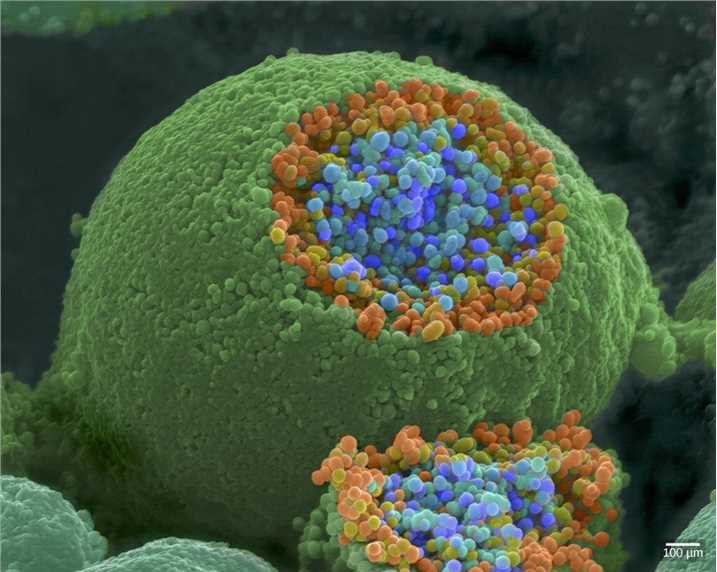Cytokine Development to Enhance Antigen Presentation
Creative Biolabs is a world leader in the field of cancer vaccine development. We have a variety of strategies that are aimed at improving the immunogenicity of the cancer vaccines including treating with cytokines. With our extensive experience and advanced platform, we are therefore confident in offering the best development services to improve the efficacy of cancer vaccines. We guarantee the finest results for our customers all over the world.
Cytokines have been used to treat advanced cancers, including renal cell carcinoma and metastatic melanoma with some success, but systemic administration is associated with marked toxicity. Recombinant cytokines expressed by modified tumor cells can be used to target the cytokine to tumor or vaccination sites where they can induce a proinflammatory environment, with the additional benefit of lowering the levels of circulating cytokine and therefore circumventing the toxicity related to high systemic doses.
Cytokine-secreting tumor cells have been tested extensively in mouse models for their efficacy in reducing tumorigenicity, protecting against tumor challenge and raising immune responses. Creative Biolabs is developing a range of cytokines, which have been shown to have potential in cancer vaccine models.
 Distributed under CC BY 4.0, from Wikimedia, without modification.
Distributed under CC BY 4.0, from Wikimedia, without modification.
IL-2
Interleukin 2 is produced by CD4+ T cells of the TH1 type. It supports recruitment, differentiation, and proliferation of T and NK cells and is frequently used systemically for the treatment of renal cell carcinoma and melanoma. In autologous IL-2-secreting cell vaccination models, there is a requirement for CD8+ T cells and/or NK cells to establish effective protection against tumor challenge. In a study, where allogeneic cell vaccines are shown to be protective against tumor challenge in a prophylactic treatment model, IL-2-secreting vaccine is more effective than unmodified cells. Furthermore, vaccination with IL-2-secreting allogeneic cells gave rise to a cytotoxic response that recognized syngeneic tumor.
GM-CSF
To date, GM-CSF is the most commonly used vaccine adjuvant in cancer vaccines and currently is being used in clinical trials in the form of a systemically administered recombinant cytokine or via gene therapy with GM-CSF-transfected tumor cells or subcutaneous delivery of poxviruses expressing GM-CSF. Although GM-CSF has highly pleiotropic effects, it is involved principally in stimulation of proliferation and activation of granulocytes and monocytes. GM-CSF stimulates dendritic cell maturation and is able to augment APC function. Protective immunity is induced by vaccination with allogeneic GM-CSF-secreting cells, and stimulation of cytotoxic responses to tumor cells has been demonstrated.
Tumor Necrosis Factor-α (TNF-α)
TNF-α was the main component of the earliest cancer immunotherapy approach. In addition to the direct effects of TNF-α on tumor cells, TNF-α also regulates antigen presentation. A possible mechanism for this enhanced antigen presentation was the upregulation of HLA-DR molecules after TNF-α treatment of monocytes. Thus, the use of TNF-α for tumor immunotherapy could be a two-pronged attack, first by directly inducing cytotoxicity in tumors and second by potentiating antigen presentation and subsequently promoting anti-tumor immunity. The combination of GM-CSF and TNF-α increased the yield of CD1a+ DCs by 10 to 20-fold from CD34+ hematopoietic stem cells from umbilical cord blood. Culture with TNF-α alone had no effects on the differentiation of stem cells. Given the higher efficacy of combined GM-CSF and IL-4 treatments to increase the number of DCs in vivo, recombinant TNF-α likely appears better suited for cancer vaccine strategies employing DCs generated in vitro, in combination with GM-CSF.
Flt3 Ligand
FL is a colony-stimulating factor that can induce proliferation, self-renewal, and differentiation of hematopoietic stem cells. FL can be used to promote DC expansion, antigen presentation, and subsequent adaptive (antigen-specific) immunity. Given the ability of FL to promote generation of DC precursors in vivo, FL was evaluated as a potential adjuvant for cancer vaccine strategies. FL alone effectively expands DC precursors (44 to 48-fold) but that these DCs were not as effective at antigen presentation as the more mature DCs generated with GM-CSF. The most productive use of FL in cancer vaccines is in combination with other cytokines for either in vivo or ex vivo differentiation of DCs. Recombinant FL is safe, but its clinical use remains to be optimized and its production for continued clinical study in the U.S. needs to be renewed.
Interferons
Interferons (IFN) were first described in 1957 as antiviral cytokines by Issacs and Lindenmann. Type I IFNs are highly heterogeneous with over 14 proteins produced in humans that include the major subtypes IFN-α, secreted by leukocytes, and IFN-β, secreted by fibroblasts. Type I IFNs signal through a Type I IFN-α or IFN-β receptor. IFN-γ is the only Type II interferon known and is secreted by activated NK cells and CD8+ cytotoxic T lymphocytes. IFN-γ signals through a single IFN-γ receptor expressed on nearly all cells, including tumor cells. IFNs demonstrate anti-proliferative and cytotoxic effects on cells, which led to their early use in cancer therapy. Type I IFNs treatments of various tumor cell lines in vitro have shown cytotoxic and anti-proliferative effects. The effects of IFNs on antigen presentation have been studied and are most apparent in the treatment of melanoma and renal cell carcinoma. IFN-α could facilitate antigen presentation directly from leukemic cells through upregulation of MHC molecules and other DC antigens. Additional evidence in breast and colon cancers suggests that IFN-α treatment may also directly increase expression of select antigens on tumor cells.
Creative Biolabs is a leader in the field of vaccine development and has focused on the cancer vaccines for years. We have experienced experts and advanced platforms that are able to provide excellent services. If you are interested in our services, please contact us for more details.
All of our products can only be used for research purposes. These vaccine ingredients CANNOT be used directly on humans or animals.


